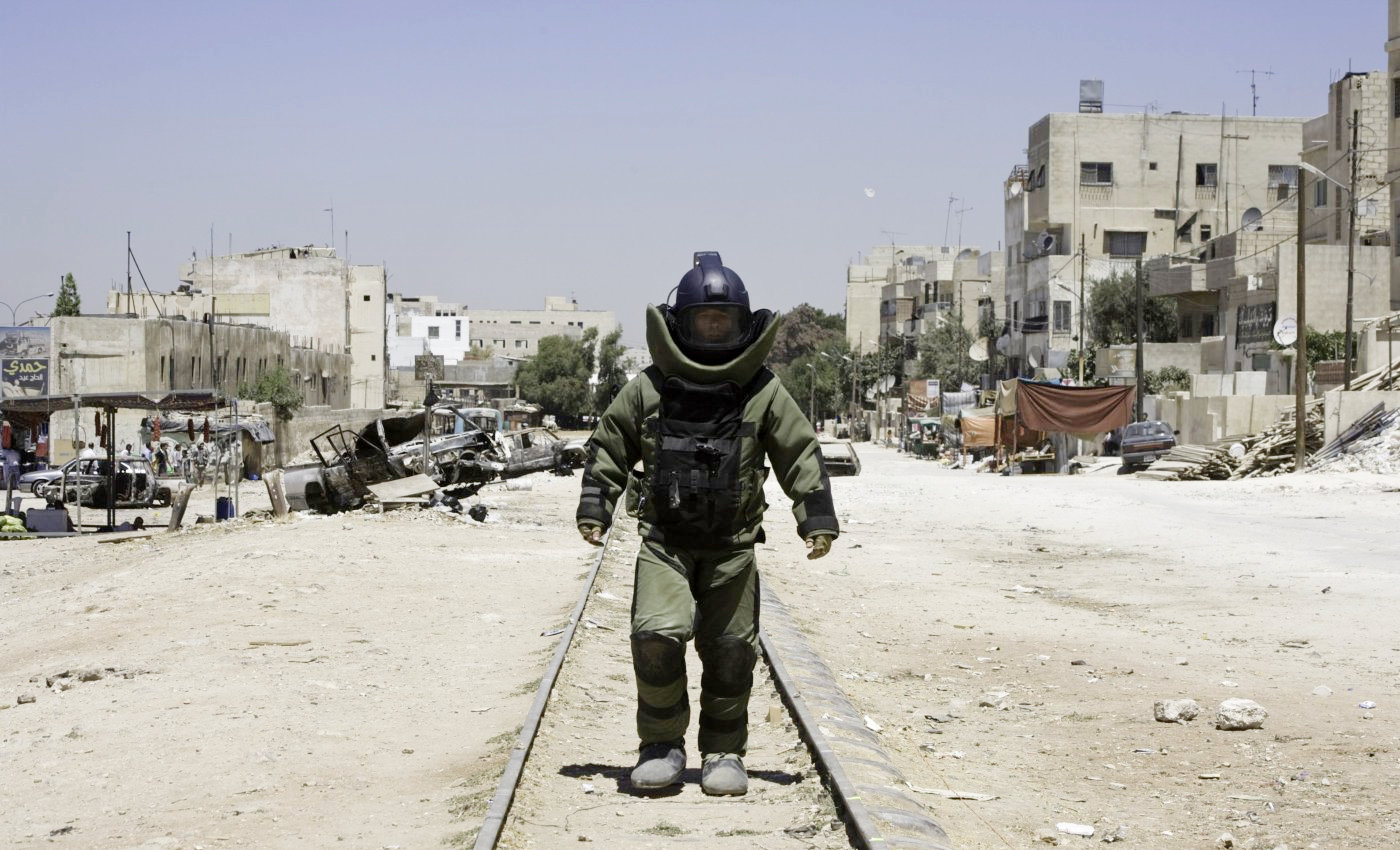 Last of
Last of the past weekend’s offerings was
Kathryn Bigelow’s lean, gripping The Hurt Locker. A taut, minimalist “men-in-combat” thriller that immediately goes up on the top shelf of Iraq flicks next to
HBO’s Generation Kill (and, if you’re counting Gulf War I,
Three Kings),
The Hurt Locker is also that rare thing in the summer of
Terminator: Salvation,
Transformers, and
GI Joe: a war movie for grown-ups. Very highly recommended.
As The Hurt Locker opens, we meet a three-man Explosive Ordnance Disposal (EOD) team out of Bravo Company doing what they do best: locating, examining, and disposing of an Improvised Explosive Device (IED) in the streets of Baghdad. Even on a run-of-the-mill call like this, and despite the jaunty banter among team members — the temperature is rising, the tension is thick, and the situation is life-or-death. For the IED in question could blow at any moment and take out everybody around…or it could be triggered by any one of the onlookers gathered, perhaps innocuously, perhaps not, to watch the soldiers work. Well, in this particular case of somebody-setting-us-up-the-bomb, things happen to go terribly awry. And, only six weeks out from the end of Bravo Company’s deployment, a crucial spot opens up on this EOD team.
Enter Staff Sgt. William James (Jeremy Renner), an amiable, reckless, possibly suicidal fellow who, not unlike Harry Tuttle, “came into this game for the action, the excitement. Go anywhere, travel light, get in, get out, wherever there’s trouble, a man alone.” (It’s this same devil-may-care attitude and notable lack of self-protective instinct, presumably, that eventually got him reassigned to zombie-stricken London.) Particularly showing up as he does so close to Bravo Company’s ship-out date, James’ cowboy moxie in the field causes huge headaches for his teammates (Anthony Mackie, Brian Geraghty), who even at one point contemplate fragging the guy. But, just as Jimmy McNulty is startlingly good po-lice despite his many disastrous personal foibles, Staff Sgt. James turns out to be surprisingly in his element whenever the situation deteriorates. And, amid the alleyways, warehouses, dust, and rubble of the Emerald City, the situation tends to deteriorate pretty much constantly.
The Hurt Locker isn’t really a commentary on our Iraq excursion like other movies in the genre we’ve seen of late. (Grace is Gone, Lions for Lambs) Like Generation Kill, it aims mainly to recreate the visceral experience of the war by getting us into the headspace of the men on the front lines. Inasmuch as there is a wider moral to this tale, it’s found in the epigram — “war is a drug” — taken from Chris Hedges’ War is a Force that Gives Us Meaning. Or, if you’d prefer, the same point is found in the first ten minutes of Apocalypse Now: “When I was home after my first tour, it was worse…I hardly said a word to my wife, until I said ‘yes’ to a divorce. When I was here, I wanted to be there; when I was there, all I could think of was getting back into the jungle.“
Scratch a little deeper, tho’, and you can find glimmers of a wider critique of the Iraq fiasco in Bigelow’s film — indeed, you could argue that these moments have more force because they’re so throwaway. After a Iraqi cabbie breaks a cordon, stares down the EOD team for unclear reasons, and is summarily carried away after finally backing down, James quips, “Well, if he wasn’t an insurgent, he sure is one now.” Later, David Morse briefly appears as some high-ranking muckety-muck akin to Godfather who has little regard for Geneva niceties, and Ralph Fiennes and Jason Flemyng also show up as British operatives looking to make some easy quid as bounty hunters on the side.
These small moments notwithstanding, The Hurt Locker is mostly apolitical, focusing mainly on the men (and it’s just men here) who find themselves deep in the midst of the suck. And, on that level, it’s a rousing success. In all honesty, the film cheats a bit by giving this EOD team a wider set of experiences than I think is probably likely — at various points they are forced into sniper and resource extraction missions by the course of events. But, that’s a quibble — for the most part Hurt Locker is as tense a thriller as I’ve seen in years.
Bigelow understands intuitively what far too many action directors these days miss: It’s not the size of the explosion or the volume of bullets fired that determine the quality of an action flick, but the slow, remorseless buildup to the potentially deadly events. In vignette after vignette, The Hurt Locker ratchets up the suspense by degrees, until you find yourself — like the EOD team we’re following — living out each moment in a heightened state of tension, endlessly waiting for the other shoe to drop. It’s an impressive moviemaking feat, and it helps to make The Hurt Locker one of the best films of the year.



